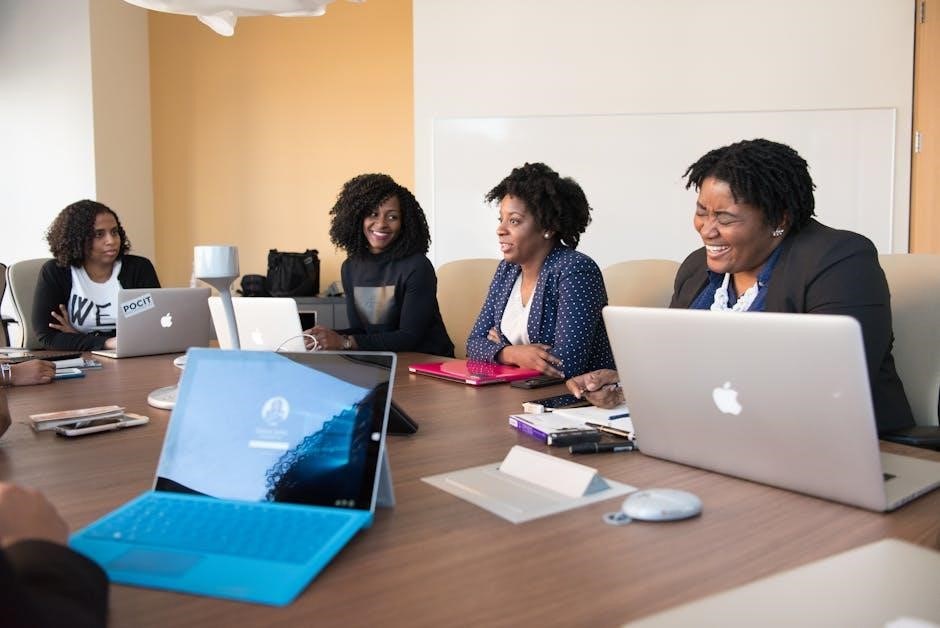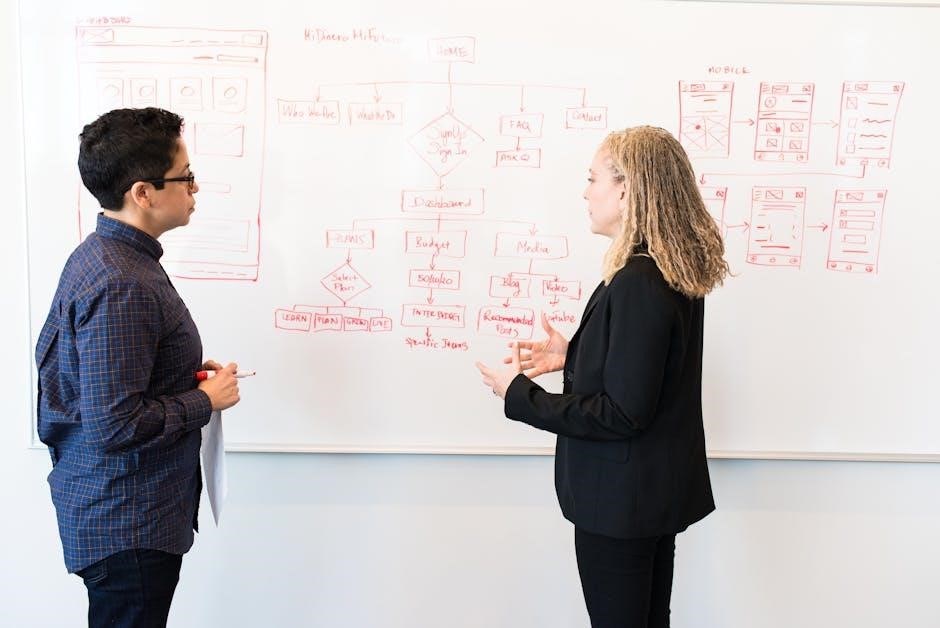Exploring inspiring themes for women’s conferences, the PDF guide offers comprehensive insights into leadership, empowerment, entrepreneurship, and faith, providing resources to foster connections and drive meaningful change globally․
Overview of Popular Themes and Trends
Popular themes for women’s conferences often center on empowerment, leadership, and personal growth, addressing global issues like gender equality and workplace challenges․ Trends include focusing on mental health, work-life balance, and financial literacy, while emphasizing resilience and collaboration․ The impact of COVID-19 on women and the importance of mentorship are also key topics․ These themes are designed to inspire and equip women with tools for success, fostering a sense of community and shared purpose․ Such trends reflect the evolving needs of women in various spheres of life, from professional to personal and spiritual domains․
Importance of Tailoring Topics to Audience Needs
Tailoring conference topics to the audience’s needs ensures relevance and engagement, fostering meaningful connections and personal growth․ Surveys and feedback can help identify key issues, such as workplace challenges or mental health, ensuring content resonates deeply․ Addressing diverse perspectives, including age, profession, and cultural background, creates an inclusive environment․ Incorporating elements like prayer, Bible teachings, or global issues ensures the content aligns with the audience’s values and aspirations․ This personalized approach not only enhances the event’s impact but also empowers women to address their unique challenges effectively, fostering a sense of community and shared purpose․

Leadership and Empowerment
Empowering women to break barriers, fostering resilience, and cultivating strong leadership skills are central themes, enabling them to overcome obstacles and achieve their full potential․
Breaking the Glass Ceiling: Challenges and Strategies
Women often face systemic barriers like gender bias, stereotypes, and limited opportunities․ Strategies to break the glass ceiling include mentorship programs, networking, and advocating for policy changes․ Building resilience and confidence is crucial․ Organizations can foster inclusive cultures by promoting diversity and addressing implicit biases․ Empowering women to negotiate and assert their roles in leadership positions is key․ Collective efforts from individuals, businesses, and policymakers are essential to create equitable opportunities and dismantle barriers․ This fosters a more inclusive environment where women can thrive and lead effectively․
Women in Leadership Roles: Success Stories and Lessons
Women in leadership roles inspire by overcoming challenges and achieving remarkable success․ Stories of pioneers like Andrea Bradley, who chaired the STUC Women’s Committee, highlight resilience and vision․ These leaders demonstrate how balancing personal and professional lives, while advocating for gender equality, can drive transformative change․ Their journeys reveal the importance of mentorship, strategic goal-setting, and leveraging faith for motivation․ Such success stories offer valuable lessons, encouraging aspiring leaders to embrace their purpose and strive for excellence in their fields, creating a lasting impact for future generations of women in leadership․
Mentorship Programs for Emerging Female Leaders
Mentorship programs play a crucial role in nurturing emerging female leaders, offering guidance, support, and practical advice․ These initiatives foster meaningful connections, helping women build confidence and navigate career challenges․ Through structured mentorship, participants gain insights into leadership strategies, goal-setting, and overcoming obstacles․ The Event Toolkit by Revive Our Hearts provides resources for mentoring programs, emphasizing life-on-life mentoring and biblical principles․ Such programs empower women to embrace their potential, creating a ripple effect of positive change in their communities and professions․
These programs are tailored to address the unique needs of female leaders, ensuring they receive personalized development opportunities․ By equipping women with essential skills and encouragement, mentorship initiatives contribute to a stronger, more resilient leadership landscape․

Entrepreneurship and Financial Independence
Empowering women to overcome entrepreneurial challenges, this section explores strategies for building sustainable businesses, achieving financial literacy, and fostering independence through innovative approaches and mentorship programs․
Overcoming Challenges Faced by Female Entrepreneurs
Female entrepreneurs often face unique obstacles, including gender bias, limited access to funding, and balancing work-life responsibilities․ Addressing these challenges requires strategic mentorship, networking, and financial literacy․ Workshops and guides provide practical tools to navigate these issues, empowering women to build sustainable businesses and achieve economic independence․ By fostering resilience and innovation, women can overcome barriers and thrive in entrepreneurial landscapes, creating impactful change globally․
Building a Sustainable Business Model
Creating a sustainable business model is crucial for female entrepreneurs to ensure long-term success․ This involves aligning business goals with ethical practices, fostering innovation, and prioritizing social and environmental impact․ By adopting resilient strategies and leveraging resources, women can build enterprises that thrive while contributing positively to their communities․ Sustainable models also emphasize adaptability, enabling businesses to navigate challenges and evolve over time, ultimately driving meaningful change and inspiring future generations of female leaders․
Financial Literacy for Women: Key Principles
Mastering financial literacy is essential for women to achieve economic independence and security․ Key principles include understanding budgeting, saving, and investing, as well as managing debt and building credit․ Women should also grasp retirement planning and the importance of emergency funds․ Education on navigating financial markets and avoiding scams is crucial․ Additionally, addressing the gender pay gap and advocating for equal economic opportunities are vital components of financial empowerment․ By acquiring these skills, women can make informed decisions, secure their futures, and create lasting financial stability for themselves and their families․
Gender Equality and Social Justice
Addressing gender equality and social justice is fundamental to empowering women globally․ It involves combating discrimination, advocating for equal rights, and addressing systemic inequalities to create a fair society․
Current Global Issues in Gender Equality
Current global issues in gender equality include the impact of the COVID-19 pandemic, which has exacerbated workplace discrimination and caregiving burdens for women․ Workplace issues such as unequal pay, limited job opportunities, and gender-based violence remain significant challenges․ Campaigns addressing young women’s issues highlight the need for decent jobs and capacity building․ Advocacy efforts focus on creating safe environments, promoting equal rights, and addressing systemic inequalities․ These issues underscore the importance of global collaboration to achieve gender equality and empower women across all sectors of society․
The Role of Women in Advocating for Social Change
Women play a pivotal role in advocating for social change by leveraging their unique perspectives and collective power․ Through leadership in campaigns against gender-based violence and workplace discrimination, women drive transformative movements․ Education and awareness initiatives empower women to challenge systemic inequalities and promote justice․ Collaborative efforts, such as organizing young women’s capacity-building programs, foster resilience and amplify voices․ By championing equality and human rights, women inspire global action, proving their indispensable role in shaping a more equitable and inclusive society for future generations․
Addressing Workplace Discrimination and Bias
Addressing workplace discrimination and bias is critical for fostering inclusive environments․ Women often face challenges such as unequal pay, limited opportunities, and systemic biases․ Strategies include promoting gender equality policies, encouraging diversity training, and creating safe spaces for dialogue․ Education and awareness campaigns can help dismantle stereotypes and foster respect․ Empowering women to advocate for their rights and supporting leadership development are key steps toward equity․ By addressing these issues, organizations can create workplaces where women thrive, contributing to a more just and equitable society for all․

Health and Wellness
Prioritizing women’s health and wellness involves addressing physical and mental well-being, promoting self-care strategies, and fostering work-life balance․ COVID-19’s impact on women’s health highlights the need for accessible care and stress management solutions, ensuring holistic well-being for all․
Physical and Mental Health Awareness for Women
Physical and mental health awareness for women is crucial, addressing unique challenges such as stress management, self-care, and access to healthcare․ The COVID-19 pandemic has heightened the need for tailored health strategies, emphasizing the gendered impact on women’s well-being․ Encouraging open conversations about mental health and providing resources for mindfulness and resilience-building are essential․ Education on nutrition, exercise, and emotional well-being empowers women to take charge of their health․ Prioritizing holistic wellness ensures women can thrive in all aspects of life, fostering a culture of care and support․
Work-Life Balance: Strategies for Women
Achieving work-life balance is essential for women’s well-being, especially in today’s fast-paced world․ Practical strategies include time management tools, setting clear boundaries, and leveraging technology to enhance productivity․ Encouraging flexible work arrangements and self-care practices can help women juggle professional and personal responsibilities․ Employers play a crucial role in supporting work-life balance through policies like remote work and mental health resources․ Building a support network and prioritizing personal time are key to maintaining harmony and avoiding burnout, enabling women to thrive both personally and professionally․
The Impact of COVID-19 on Women’s Health
COVID-19 disproportionately affected women’s health, exacerbating existing disparities․ Increased caregiving roles and mental health challenges, such as anxiety and stress, became prevalent․ Women faced reduced access to healthcare services and reproductive care due to pandemic restrictions․ The crisis also highlighted the need for gender-specific policies to address these unique challenges․ Ensuring women’s health and well-being requires targeted interventions and continued advocacy to mitigate long-term impacts and build resilient healthcare systems․

Education and Personal Growth
Empowering women through continuous learning, resilience-building strategies, and the power of networking fosters personal and professional development, enabling them to thrive in all aspects of life․
Continuous Learning Opportunities for Women
Continuous learning is a cornerstone of personal and professional growth for women․ Workshops, webinars, and courses tailored to women’s needs provide invaluable skills and knowledge․ These resources address topics like leadership, entrepreneurship, and faith, empowering women to bridge skill gaps and adapt to evolving challenges․ By fostering a culture of lifelong learning, women gain confidence, resilience, and the tools to thrive in diverse environments․ Such opportunities not only enhance individual capabilities but also contribute to collective progress, creating a ripple effect of empowerment and transformation in communities worldwide․
Building Resilience: Coping with Life’s Challenges
Building resilience is essential for women to navigate life’s challenges with strength and grace․ Workshops and resources focus on equipping women with practical tools to manage stress, overcome setbacks, and thrive in adversity․ Through shared experiences, mentorship, and spiritual guidance, women learn to reframe challenges as opportunities for growth․ Resilience-building strategies include mindfulness, goal-setting, and fostering a supportive community․ By cultivating emotional and mental fortitude, women can embrace their unique journeys with confidence, transforming obstacles into stepping stones for personal and professional fulfillment․
The Power of Networking in Professional Development
The power of networking is a cornerstone of professional development for women․ Conferences and resources emphasize the importance of building connections, fostering collaboration, and leveraging relationships to advance careers․ Women gain access to mentorship, job opportunities, and industry insights through strategic networking․ Workshops and panels often highlight success stories where networking played a pivotal role․ By cultivating a supportive community, women can navigate challenges and achieve their goals more effectively․ Networking not only enhances career growth but also creates a sense of belonging and mutual support among professionals․

Faith and Spirituality
Exploring the intersection of faith and personal growth, conferences inspire women to find purpose and motivation through prayer, fellowship, and Godly ambition, fostering spiritual resilience and community․
Godly Ambition: Finding Purpose and Motivation
Godly Ambition conferences empower women to align their goals with faith, offering inspiration through success stories and practical goal-setting strategies․ These events encourage women to find motivation and purpose by combining spiritual principles with actionable steps, fostering a deeper connection with their faith and personal aspirations․ Attendees gain tools to overcome challenges and stay focused on their divine purpose, creating a balanced and fulfilling life that reflects their values and ambitions․
Christian Women’s Conference Themes
Christian women’s conference themes often revolve around faith, purpose, and spiritual growth․ Topics like “Godly Ambition” and “True Womanhood” inspire attendees to align their lives with biblical principles․ These events emphasize scripture-based teachings, fostering personal and communal devotion․ Resources such as devotionals, toolkits, and prayer guides are provided to enhance the experience․ The focus is on creating a space for women to deepen their faith, find motivation, and connect with like-minded individuals, ensuring a transformative and uplifting experience rooted in Christian values․
Prayer and Fellowship: Strengthening Faith
Prayer and fellowship are cornerstone themes in women’s conferences, fostering spiritual growth and unity․ These gatherings emphasize the power of collective prayer, creating a sacred space for women to connect deeply with God and one another․ Through prayer circles, worship sessions, and shared testimonies, attendees experience renewal and encouragement․ Fellowship activities, such as small group discussions and community-building exercises, strengthen bonds and provide support systems․ These practices help women cultivate a stronger faith, find comfort in shared experiences, and leave feeling refreshed and empowered in their spiritual journeys․

Global Issues Affecting Women
Addressing gender equality, COVID-19 impacts, and globalization, conferences highlight challenges women face, fostering dialogue on economic disparities, healthcare access, and social justice to drive global solutions․
The Gendered Impact of the COVID-19 Pandemic
The COVID-19 pandemic has disproportionately affected women globally, exacerbating existing gender inequalities․ Women faced increased caregiving responsibilities, higher job losses, and greater mental health challenges․
Conferences highlight how women’s roles in healthcare, education, and informal economies were disproportionately impacted․ Discussions focus on systemic inequities, such as limited access to healthcare and economic instability․
Addressing these issues requires targeted solutions to support women’s recovery and resilience, ensuring gender-sensitive policies are integrated into global responses․
Globalization and Its Effects on Women
Globalization has significantly impacted women’s lives, creating both opportunities and challenges․ While it has opened doors to new job opportunities and global connections, it has also intensified disparities․ Women often face unequal wages, exploitation, and limited access to social protections․
Conferences explore how globalization affects women’s roles in the workforce, healthcare, and education․ Discussions emphasize the need for policies that promote gender equality and protect women’s rights in a globalized economy․ Addressing these issues is crucial for fostering inclusive growth and empowering women worldwide․
Young Women’s Issues: Organizing and Capacity Building
Young women face unique challenges in today’s globalized world, emphasizing the need for targeted organizing and capacity-building efforts․ Conferences highlight the importance of empowering young women through education, leadership training, and advocacy․ Topics such as decent job opportunities, gender equality, and addressing systemic barriers are central to these discussions․ By fostering collaboration and providing resources, these events help young women build resilience and actively participate in creating a more equitable future․ The focus is on equipping them with the tools to drive change and thrive in their communities and beyond․

Community Building and Collaboration
Building supportive communities empowers women to collaborate, share experiences, and collectively address challenges, fostering a network of unity and shared purpose for meaningful societal impact․
Creating Supportive Communities for Women
Building supportive communities for women involves fostering inclusive spaces where individuals can share experiences, resources, and encouragement․ These communities help break isolation, promote collaboration, and empower women to thrive․ Through shared goals and mutual respect, such networks become powerful tools for personal and professional growth․ The PDF guide highlights strategies for organizing events, mentorship programs, and workshops that strengthen bonds and create lasting connections․ By prioritizing empathy and understanding, these communities become safe havens for women to grow, learn, and support one another in achieving their full potential․
Collaborative Efforts to Address Women’s Issues
Collaborative efforts are essential for addressing women’s issues effectively․ By uniting individuals, organizations, and communities, collective action can drive meaningful change․ The PDF guide emphasizes the importance of teamwork, shared knowledge, and resource sharing to tackle challenges like gender equality and social justice․ Through partnerships and alliances, women can amplify their voices, pool resources, and create impactful solutions․ These collaborative strategies not only foster innovation but also ensure that efforts are sustainable and far-reaching, ultimately empowering women to overcome obstacles and achieve their goals together․
Engaging Women in Decision-Making Processes
Engaging women in decision-making processes is crucial for fostering equality and inclusivity․ The PDF guide highlights strategies to ensure women’s voices are heard and valued in various settings․ By promoting active participation in leadership roles, policy-making, and community initiatives, women can contribute meaningfully to solutions that affect their lives․ Encouraging diverse perspectives and creating inclusive platforms empowers women to influence change․ This collective involvement not only strengthens decision-making but also paves the way for a more equitable and just society, where women are integral to shaping the future․
Planning and Organizing Women’s Conferences
Planning a successful women’s conference involves strategic steps, from selecting impactful themes to securing inspiring speakers․ The PDF guide offers tools and resources to streamline the process effectively․
Steps to Plan a Successful Women’s Event
Planning a women’s conference requires a structured approach․ Start by defining clear goals and objectives aligned with the audience’s needs․ Choose a theme that resonates with attendees, ensuring relevance and impact․ Select inspiring speakers and workshop facilitators who can deliver valuable insights․ Secure a suitable venue and manage logistics, including catering and technology․ Promote the event through various channels to maximize attendance․ Engage attendees with interactive sessions, networking opportunities, and practical takeaways; Finally, follow up with participants to gather feedback and share resources, ensuring the event’s legacy endures․
Choosing Relevant and Impactful Themes
Selecting the right theme is crucial for a women’s conference․ Themes should align with the audience’s interests, challenges, and aspirations, ensuring engagement and relevance․ Popular topics include leadership, empowerment, entrepreneurship, and faith, as highlighted in the PDF guide․ Consider current global issues, such as gender equality and mental health, to address timely concerns․ Themes like “Godly Ambition” or “Building Resilience” resonate deeply, offering practical insights and motivation․ Ensure themes are broad enough to accommodate diverse perspectives yet focused enough to drive meaningful conversations and actionable outcomes for attendees․
Engaging Speakers and Workshop Ideas
Curating impactful speakers and workshops is essential for a successful women’s conference․ The PDF guide highlights diverse session topics, from leadership and entrepreneurship to faith-based discussions, ensuring varied engagement; Speakers should share inspiring stories, practical tips, and actionable strategies, aligning with the conference’s mission․ Workshops on goal-setting, resilience, and professional growth are particularly popular, offering attendees tangible takeaways․ Interactive sessions, panel discussions, and collaborative activities foster deeper connections and learning, making the event memorable and transformative for all participants․
Concluding, the guide equips women with vital tools for personal and professional growth․ Utilize the provided resources to embark on meaningful journeys toward empowerment and change․
Recap of Key Topics and Takeaways
The comprehensive guide on women’s conference topics covers essential themes such as leadership, entrepreneurship, health, and faith․ It emphasizes empowerment through mentorship, financial literacy, and overcoming global challenges like COVID-19․ The resource highlights the importance of tailoring content to diverse audiences, ensuring relevance and impact․ Practical steps for planning successful events, selecting themes, and engaging speakers are also provided․ Attendees gain actionable insights and tools to drive personal and collective growth, fostering meaningful connections and inspiring lasting change in their communities and beyond․
Resources for Further Learning and Action
For deeper exploration, the PDF guide offers a wealth of resources, including workshop ideas, Christian conference themes, and tools for event planning․ It features inspiring stories of women in leadership and practical advice for entrepreneurs․ Additionally, the guide provides links to downloadable materials, such as devotionals and event toolkits, to support ongoing learning․ Readers can also access webinars, workshops, and community groups focused on empowerment, faith, and global issues․ These resources empower women to take action, fostering personal growth and collective impact in their communities and beyond․
